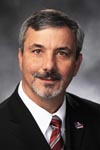JEFFERSON CITY, Mo. – In the first half of a two day hearing, House Hearing Room 3 was filled Wednesday with athletic directors, superintendents and other school administrators from around the state to hear and provide testimony with the Interim Committee on the Missouri State High School Activities Association (MSHSAA).

Chairman Steve Cookson, R-Poplar Bluff, and representatives asked questions of Dr. Kerwin Urhahn, the executive director of MSHSAA, over a litany of topics to ascertain the nature of the association and the role it plays in furthering education in the state. Last session, Cookson sponsored legislation that would call for a financial audit on extracurricular activities at schools, but the legislation was not heard on the floor after passing committee.
Cookson urged those in attendance that this was not an effort to micromanage MSHSAA, but simply inquire as to how the organization did its business to take into account when discussing future legislation.
“This is not a witch-hunt,” Cookson said to start the hearing. “No legislation will come from this, we will just be trying to get an understanding of what MSHSAA is.”
However, some of the practices of MSHSAA furrowed more than a few eyebrows of those on the committee, especially when one conversation arose with Urhahn about potential legislation that would essentially force public schools to allow homeschooled athletes in their sports. The measure has been maligned by many school districts.
“If that’s what the legislature passes, then I tell our schools, ‘Folks we have no option. We’ve got to get something in place,’” Urhahn said.
The discussion came up as part of a conversation on unaccredited schools retaining their MSHSAA membership and being permitted to field athletes while not providing an accredited education. Some representatives felt it created an inconsistent standard when it came to homeschool kids that were receiving a quality education.
Rep. Paul Fitzwater, R-Potosi, a retired teacher, coach and current basketball referee, noted that such a law would open a “Pandora’s box” of problems, such as athletes not making grades simply dropping public school for private school, where grades are up to the sole discretion of the parents. Rep. Jay Barnes, R-Jefferson City, suggested homeschooled athletes could take tests to prove they could make grades or “weed out” those not actually being educated at home.
Outside of that discussion, Cookson expressed some concern over the large costs on venues for championship tournaments. Urhahn said MSHSAA currently pays $180,000 a year for the state football championship to be played at the Edward Jones Dome. High fees, from $60,000 to $100,000, are also paid for the state basketball and wrestling championships which take place on the campus of the University of Missouri.
All the while, admissions fees at individual school events, nor at the state championship events, have not changed from a few dollars a ticket for years.
“Why have prices not gone up for admittance and the like… to give back to the school districts?” Cookson asked.
The discussion went in many other directions. Dr. Mark Halstead, the concussion program director for MSHSAA and a team doctor for the St. Louis Rams and Lafayette High School, testified on the safety of student athletes and the need for more athletic trainers in schools as part of budget problems.
“We don’t have enough athletic trainers for every school, we don’t have the funding for every school,” Halstead said. “If you have a volunteer network that’s great… but it’s a struggle.”
He also spoke briefly on concussion protocols.
Two school administrators also spoke to voice their support for MSHSAA and reiterate that it was the schools who crafted MSHSAA policy and guidelines.
“The most important thing I’d like to say, we are the people who make the rules, the schools make the rules,” said Tony Berry, an assistant superintendent for School of the Osage.








